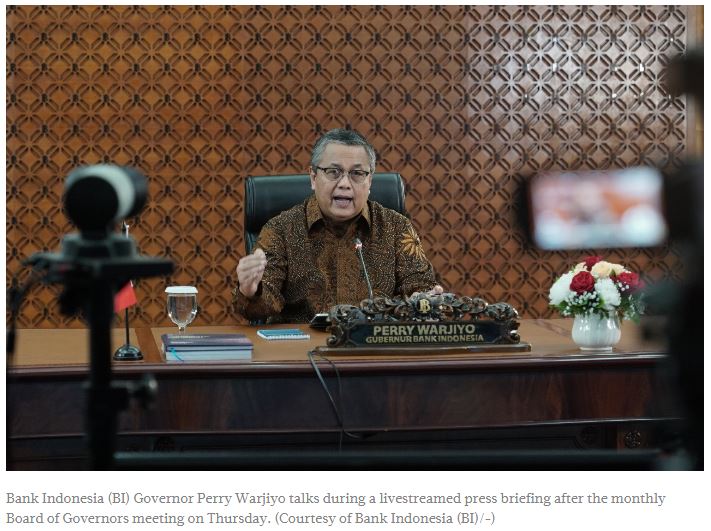Bank Indonesia trims policy rate to boost growth, signals further cut
Bank Indonesia (BI) has cut its benchmark interest rate – after a two-month pause – to support economic growth, which is likely to fall to its lowest since the 1999 Asian financial crisis.
The central bank slashed its benchmark interest rate, the BI seven-day reverse repo rate, by 25 basis points to 4.25 percent on Thursday. The move is the third cut this year as a significant deterioration in the economic outlook during the pandemic has forced policymakers to take extra measures to bolster growth.
“This decision is consistent with efforts to maintain stability and bolster economic recovery amid the coronavirus pandemic,” BI Governor Perry Warjiyo told a livestreamed press briefing.
“BI sees room for further reduction in line with low inflationary pressure, maintained external stability and the need to boost economic growth. Our policy stance remains accommodative.”
The central bank also lowered its deposit facility rate to 3.5 percent and its lending facility rate to 5 percent. The lower benchmark rate is expected to transmit into lower bank loan interest rates that will affect interest rates for consumer loans, corporate loans and mortgages, as well as bond yields and other instruments.
It revised down on Thursday Indonesia’s economic growth projection to between 0.9 percent and 1.9 percent this year from the previous estimate of 2.3 percent. The central bank expects the economy to grow between 5 and 6 percent next year.
“The economy is at its lowest point in May, but it has started to pick up,” Perry said. “BI expects the economy to recover in the third quarter following the easing of [mobility] restrictions and thanks to stimuli from the government and central bank.”
The government has also trimmed its growth forecast for the year to between 0 percent and 1 percent, Finance Minister Sri Mulyani Indrawati said on Tuesday, adding that she expected the economy to shrink by 3.1 percent year-on-year in the second quarter.
The fiscal authority has allocated Rp 695.2 trillion (US$49.63 billion) in funds for healthcare and economic stimulus spending to cushion the impact of the outbreak. This is the latest increase from the previous budget of Rp 677.2 trillion, as the government seeks to increase its stimulus for labor-intensive industries and regional administrations.
The central bank’s governor also pledged Thursday to continue with both direct government bond purchases in the primary market or through auctions and with its quantitative easing measures.
“We will also provide liquidity funds for banks to ensure smooth debt restructuring and financing in order to support the recovery,” Perry said.
Financial Services Authority (OJK) data show that the banking industry restructured loans totaling Rp 517.2 trillion from 5.33 million debtors as of May 26, following a regulation that allows businesses hit by the pandemic to apply for loan restructuring to minimize bad credit.
Meanwhile, the rupiah exchange rate has continued to strengthen since the BI policy meeting in May, gaining more than 5 percent over the past month, according to the central bank. The currency has depreciated 1.42 percent since the start of year and was trading at Rp 14,100 per US dollar on Thursday.
Perry said the currency was still “undervalued” and expected it to gain further to reflect its fundamentals, citing the narrower current account deficit (CAD) and low inflation. The central bank expects the CAD to fall to around 1.5 percent of the GDP and inflation to remain within its target range of 2 percent to 4 percent.
“The benchmark rate cut is a much-needed move, as the recent Jakarta Composite Index and rupiah rallies have started to lose momentum,” said Mirae Asset Sekuritas Indonesia economist Anthony Kevin on Thursday.
“It is most likely that investors have started to put together facts that they’re not backed by a strong fundamental standpoint, namely economic growth,” he said.
“The policy rate cut is crucial to maintain rupiah stability, as the threat of another stock market crash and currency depreciation looms, which could slow the economic recovery,” he added. He is of the view that the central bank still has room for another cut by 25 bps.
“We believe cutting the interest rate is appropriate, as the central bank’s decision will help bolster economic growth in the long-term,” Bank Central Asia (BCA) economist David Sumual said.
“Meanwhile, fiscal authorities must be more aggressive in spending their budget to prop up the economy in the near term,” David said, adding he expected government spending to grow by double digits this year to help prevent a more severe economic downturn.
Source: https://www.thejakartapost.com/news/2020/06/18/bank-indonesia-trims-policy-rate-to-boost-growth-signals-further-cut.html


 Thailand
Thailand




